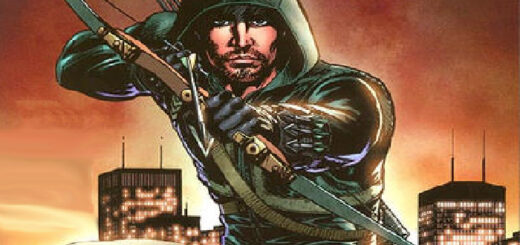See, now this is when you need a good lawyer.
For the first half of the third season in the CW series Arrow, the good guys were doing what they were supposed to do; catching bad guys in Starling City http://dc.wikia.com/wiki/Starling_City and turning them over to the police for trial As this column’s about Arrow, the good guys in question are Oliver Queen, John Diggle, Felicity Smoak, and Roy Harper. Or, if you prefer, Arrow, yada, yada, and Arsenal.
(By the way, what kind of name is Starling City? God knows what bullies like Metropolis or Gotham City are doing to it, because with a wimpy name like Starling even Smallville’s giving it a wedgie.)
Now, you might think what I was talking about, when I said someone needed a good lawyer were those aforementioned bad guys. After all captured bad guys who are awaiting trial would need a good lawyer. But, no, that’s not what I was talking about.
And before we get to what I am talking about, I should probably talk about my
SPOILER WARNING!
All of the episodes of Arrow to be discussed today aired months ago. But if you’re the type of person who doesn’t watch the show live and waits to binge it after the DVD or Blu-rays come out, you might want to stop reading and go binge watch the second season of Arrow, because certain reveals from the third season of Arrow are about to be revealed.
Anyway, the good guys kept on catching the bad guys right up until the winter hiatus. Then Ollie died at the hands of Ra’s Al Ghul. (Later he got better). As the good guys hadn’t taken Laurel Lance’s Black Canary under their wings yet, their ranks were reduced to yada, yada, and Arsenal. The good guys continued to fight the good fight. Just not as well. But they still caught some of the bad guys and gave them to the police for trial.
That’s when Danny “Brick” Brickwell appeared. Brick wasn’t the third season’s Big Bad. That would be Ra’s Al Ghul. Brick was just the main antagonist for a three-episode arc in the middle of the season. Call him a Medium Bad. I’d call him a Little Bad, but Brick was played by former British Footballer (ie., Soccer player) Vinnie Jones, who’s 6’2” and once played the Juggernaut in X-Men: The Last Stand. So, he’s hardly little.
In the comics, Brick is a crime boss with red skin that’s as tough as bricks. It gives him meta-human strength and invulnerability. He’s kind of like the Thing but with a sunburn. In the TV show, Brick is just a crime boss. Not a meta-human. Still, he’s 6’2”, a former Footballer, and was once the Juggernaut, so he’s still rather formidable.
Brick had an interesting plan for recruiting members to his gang. He broke into the warehouse where the police stored its evidence on active cases and stole the evidence. Yada, yada, and Arsenal tried to stop him. But let’s face it, without Arrow, they were a whole yada nothing. So Brick got away. With the evidence.
After that, all of the bad guys awaiting trial in the cases where Brick stole the evidence were released. Without any evidence, the DA’s office couldn’t make their cases against these people and the charges against them were dropped.
Now you would think that this is where the people needed a good lawyer. Someone to file the motions to dismiss the cases. But no. Someone – probably Brick – made sure the theft of the evidence was made public. Once that happened, the DA’s office had no choice but to drop the charges, because it no longer had the evidence it needed to make its cases. So the bad guys didn’t need a good lawyer. Even a bad lawyer would have sufficed. In fact, it was so easy, all that motion practice happened off-camera.
Brick gathered all of the bad guys he had gotten sprung and announced to them that they were his new gang. He told them he was the reason their cases were dropped and they were no longer in jail. He said they should join him out of gratitude. Then he also told them that if any of them refused to join his gang, he would send a “gift-wrapped” package of evidence back to the DA, so the dissenters could be prosecuted again. All the bad guys all agreed to be part of Brick’s gang rather than have the evidence against them returned to the DA.
Okay, we’ve reached it. Now is the time that the bad guys need a good lawyer.
Or a half-decent lawyer. Hell, even a jailhouse lawyer would have served. Just as long as it was someone who understood the concept of chain of custody http://legal-dictionary.thefreedictionary.com/chain+of+custody.
Chain of custody is one of those simple concepts of which the law has so few. Basically, it means that in order to establish that any evidence being offered actually proves what it purports to prove, the people offering the evidence has to be able to prove that it wasn’t tampered with. The chain of custody is the paper trail that tracks the evidence step-by-step and person-by-person from the moment it was first collected by the police until the moment it was introduced in court. It establishes the evidence’s provenance .
Say a gun with the murderer’s fingerprints is found next to the body at the murder scene. The chain of custody would have to show what police officer picked it up at the scene of the crime, what the officer did with it, and who accessed it after that. The lab technician who took it to dust it for fingerprints would have to sign it out of storage then sign it back in when finished with it. Same for the ballistics expert. Finally, the police officer who brought it into court would also bring with it the documentation which established the chain of custody. This is supposed to establish that the gun is the same gun found at the scene of the crime and was never swapped out for another gun in an effort to frame the defendant.
Chain of custody is a little bit more complex than that, but not much. Now what happens if a person or persons unknown handled the evidence between the time the police collected it and it was introduced into court? The chain has been broken. When the chain of custody is broken, then the defendant can move that the evidence be excluded, because the court can no longer count on the evidence proving what it was supposed to prove.
Say some evidence – like that nice murder scene firearm covered with the defendant’s fingerprints – disappeared from the evidence locker before it was tested and then reappeared in it later. As no one could be sure that someone didn’t plant the defendant’s fingerprints on the gun after the police found it to frame him, the defendant could argue the gun should be excluded, because the chain of custody had been broken.
Now let’s think bigger. Say you have a whole warehouse full of evidence which was stolen. Then some of it was returned to the DA’s office by parcel post with no return address. Imagine how big a chain of custody break that would be. When the DA tried to prosecute the defendant could argue, “Brick stole it to try to blackmail me into working with him. When I refused, he sent you back falsified evidence to frame me as punishment for refusing to work with him.”
And that’s why the bad guys needed a lawyer. So they could all tell Brick, your threats and blackmail have no power over us. You broke the chain of custody in our cases. Go ahead and give it back to the DA. The evidence can’t be used against us anyway.
If they wanted to say that, that is.
I doubt any of them would have done this. They are bad guys, after all. Bad guys on a TV show. Working for the Big Bad, or even the Medium Bad, is what they do.
















